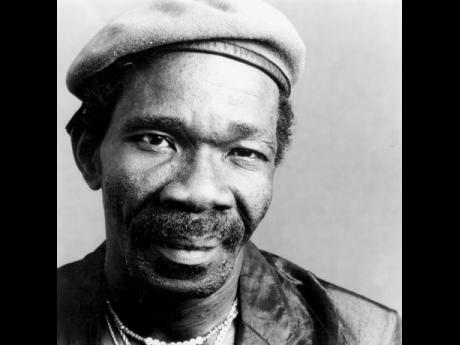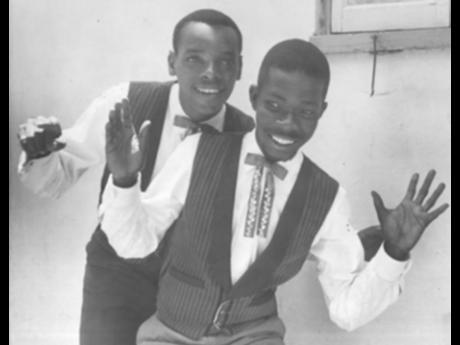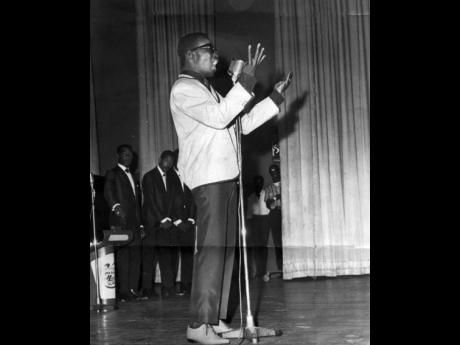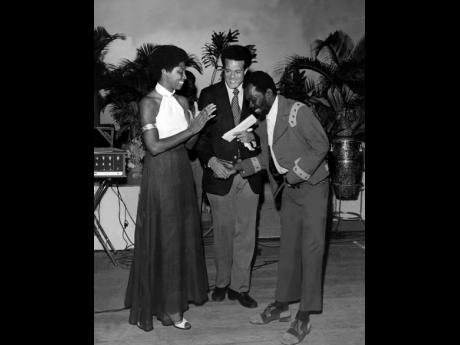Joe Higgs a legacy not to be forgotten
Lloyd ‘Bread’ McDonald of legendary reggae group, Wailing Souls, has hailed pioneer Joe Higgs as a mentor and teacher who gave selflessly to the youth of Trench Town and emphasises that his legacy should never be forgotten.
“Joe taught us all about harmonies and the components of the music, but he also taught us about the business of the music,” McDonald told The Sunday Gleaner. “He told us not to get into the habit of singing over people’s songs, because that only makes those song-writers rich. ‘Write your own songs because that will be your pension’ Joe told us ... and he was right. That’s why we can be at home and still earning.”
McDonald is one of the persons who will share memories of Higgs at ‘A Tribute to Joe Higgs The Father of Reggae’, an event which will be held on June 3 - the 84th anniversary of Higgs’ birth – at the St Andrew Park home of guitarist Earl ‘Chinna’ Smith.
The event is organised by the Joe Higgs Foundation and Smith’s Binghistra Movement.
“Joe had a good heart. He was very intelligent and very talented ... he was like a big brother to me. I went to look for him in hospital the week before he died and he said that although he didn’t get his just reward, he knew through people like us [Wailing Souls] and Jimmy Cliff he would never be forgotten. ‘I know that my legacy is safe with you guys’ Joe said. I had to go to his funeral,” McDonald shared.
Joe Higgs, who first made his name as a member of Higgs and Wilson, a duo that also included Roy Wilson, died of cancer on December 18, 1999 at Kaiser Hospital in Los Angeles.
Higgs and Wilson had a major hit in 1958 with Oh Manny Oh, produced by Edward Seaga, who would later become the prime minister of Jamaica.
In 1972, Higgs won the Jamaican Tourist Board Song Competition with Invitation to Jamaica.
“I was in the audience that night. A lot of us from Trench Town were there to support Joe. Ernie Smith was in the competition and people thought he would win, but Joe was triumphant. We were all so proud,” McDonald shared.
“The first time I became aware of who Joe Higgs was ... was one day me and my friends were hanging out at the back of the kitchen at Government Yard in Trench Town and we heard this sweet singing. It was the Wailers ... Bob, Peter, Bunny, Junior, Beverly and Cherry. Joe was teaching them harmony and breathing techniques. It gave Joe joy to impart his knowledge. Little did I know that a few years later, I too, would become one of his students,” McDonald recalled.
The Wailing Souls would later sing the harmony for Joe Higgs’ songs such as Sincerely and Brimstone and Fire, while absorbing all the teachings that the master had to generously offer.
“When Joe thought we were prepared we went out on our own In 1976 we got our first big hit, Things and Time with Channel One .. and then songs like Sweet Sugar Plum Plum, Firehouse Rock. The same thing Joe did with the Wailers he did with us. But, with Wailers, Joe used the Impressions and with us he used Harold Melvin and the Blue Notes. Teddy Prendergast was their lead singer at the time,” McDonald recalled of Higgs’ teaching strategy.
Joe Higgs pioneer work as an artiste and mentor impacted the early years of Jamaican music. He has been described as the ‘Father of Reggae’ by Jimmy Cliff, with whom he toured, acting as his bandleader and musical director. Higgs, notably, performed with The Wailers on their US tour when Bunny Wailer refused to go on the tour in 1973.
According to his Wikipedia bio, the majority of Joe Higgs’ songs were connected to his impoverished life in Trench Town. He considered that it was out of the poverty and violence in places such as Trench Town and Jones Town that the reggae music had grown. Before reggae hit big internationally with Bob Marley, it labelled “ghetto music”. Higgs was the very first artiste out of the ghetto music scene to have lyrics which primarily dealt with everyday troubles.
“Music is a matter of struggle. It’s not good that it’s known you’re from Trench Town. Reggae is a confrontation of sound. Reggae has to have that basic vibrant sound that is to be heard in the ghetto. It’s like playing the drum and bass very loud. Those are the basic sounds. A classical reggae should be accepted in any part of the world. Freedom, that’s what it’s asking for; acceptance, that’s what it needs, and understanding, that’s what reggae’s saying. You have a certain love come from hard struggle, long suffering. Through pain you guard yourself with that hope of freedom, not to give up...” Higgs is quoted as saying.
A not-so-happy part of Joe Higgs’ journey involves the song Steppin’ Razor, which he wrote in 1967 as his entry in the Festival Song Contest. It didn’t win, but was later recorded by Peter Tosh without crediting Higgs. Higgs went to court to establish his rights as composer and, later, through the intervention of Minister of Culture, Gender, Entertainment and Sport, Olivia Grange, he finally received his financial compensation.
Among his other singles are More Slavery, Creation, Let Us Do Something, and World Is Upside Down. His début album, Life of Contradiction, was recorded in 1972 for Island Records, but it remained unreleased until 1975. It has been described as “a seminally sophisticated work combining reggae, jazz, and rhythm and blues influences to create a new texture that would have a profound effect on the best Jamaican music to follow”.




